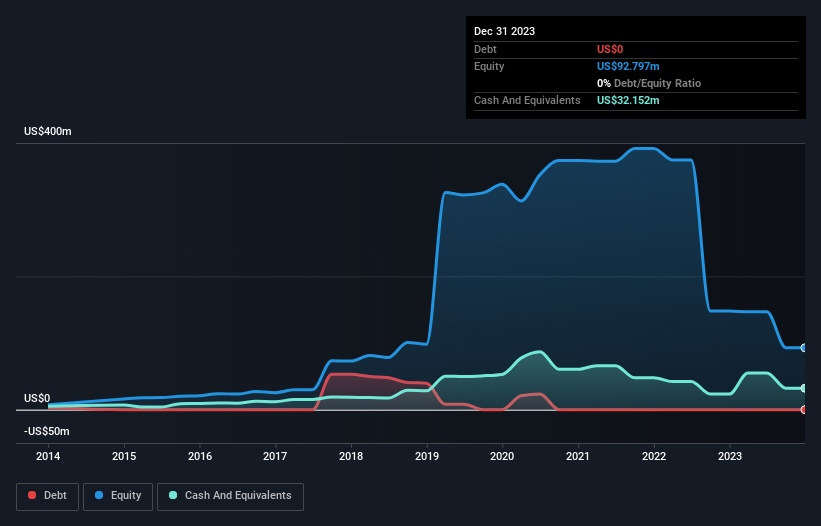Here's Why Appen (ASX:APX) Must Use Its Cash Wisely
Even when a business is losing money, it's possible for shareholders to make money if they buy a good business at the right price. For example, although software-as-a-service business Salesforce.com lost money for years while it grew recurring revenue, if you held shares since 2005, you'd have done very well indeed. Having said that, unprofitable companies are risky because they could potentially burn through all their cash and become distressed.
So, the natural question for Appen (ASX:APX) shareholders is whether they should be concerned by its rate of cash burn. In this report, we will consider the company's annual negative free cash flow, henceforth referring to it as the 'cash burn'. Let's start with an examination of the business' cash, relative to its cash burn.
See our latest analysis for Appen
How Long Is Appen's Cash Runway?
You can calculate a company's cash runway by dividing the amount of cash it has by the rate at which it is spending that cash. When Appen last reported its December 2023 balance sheet in February 2024, it had zero debt and cash worth US$32m. In the last year, its cash burn was US$43m. That means it had a cash runway of around 9 months as of December 2023. Importantly, analysts think that Appen will reach cashflow breakeven in 3 years. That means unless the company reduces its cash burn quickly, it may well look to raise more cash. Depicted below, you can see how its cash holdings have changed over time.
How Well Is Appen Growing?
It was quite stunning to see that Appen increased its cash burn by 341% over the last year. As if that's not bad enough, the operating revenue also dropped by 30%, making us very wary indeed. In light of the above-mentioned, we're pretty wary of the trajectory the company seems to be on. While the past is always worth studying, it is the future that matters most of all. So you might want to take a peek at how much the company is expected to grow in the next few years.
How Easily Can Appen Raise Cash?
Since Appen can't yet boast improving growth metrics, the market will likely be considering how it can raise more cash if need be. Issuing new shares, or taking on debt, are the most common ways for a listed company to raise more money for its business. Commonly, a business will sell new shares in itself to raise cash and drive growth. By looking at a company's cash burn relative to its market capitalisation, we gain insight on how much shareholders would be diluted if the company needed to raise enough cash to cover another year's cash burn.
Appen's cash burn of US$43m is about 61% of its US$70m market capitalisation. That's very high expenditure relative to the company's size, suggesting it is an extremely high risk stock.
How Risky Is Appen's Cash Burn Situation?
We must admit that we don't think Appen is in a very strong position, when it comes to its cash burn. While its cash runway wasn't too bad, its increasing cash burn does leave us rather nervous. One real positive is that analysts are forecasting that the company will reach breakeven. Once we consider the metrics mentioned in this article together, we're left with very little confidence in the company's ability to manage its cash burn, and we think it will probably need more money. Its important for readers to be cognizant of the risks that can affect the company's operations, and we've picked out 4 warning signs for Appen that investors should know when investing in the stock.
Of course, you might find a fantastic investment by looking elsewhere. So take a peek at this free list of interesting companies, and this list of stocks growth stocks (according to analyst forecasts)
Have feedback on this article? Concerned about the content? Get in touch with us directly. Alternatively, email editorial-team (at) simplywallst.com.
This article by Simply Wall St is general in nature. We provide commentary based on historical data and analyst forecasts only using an unbiased methodology and our articles are not intended to be financial advice. It does not constitute a recommendation to buy or sell any stock, and does not take account of your objectives, or your financial situation. We aim to bring you long-term focused analysis driven by fundamental data. Note that our analysis may not factor in the latest price-sensitive company announcements or qualitative material. Simply Wall St has no position in any stocks mentioned.
Have feedback on this article? Concerned about the content? Get in touch with us directly. Alternatively, email [email protected]
